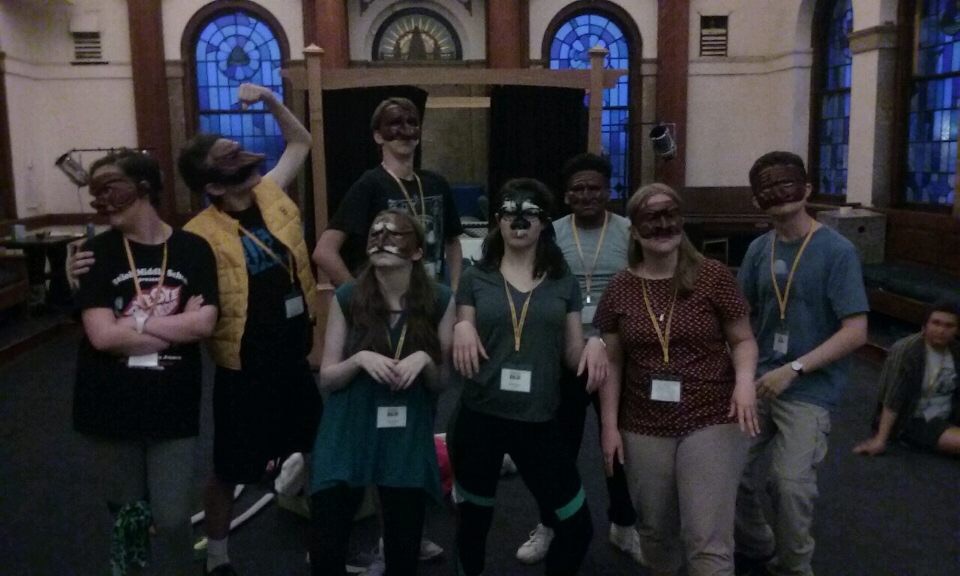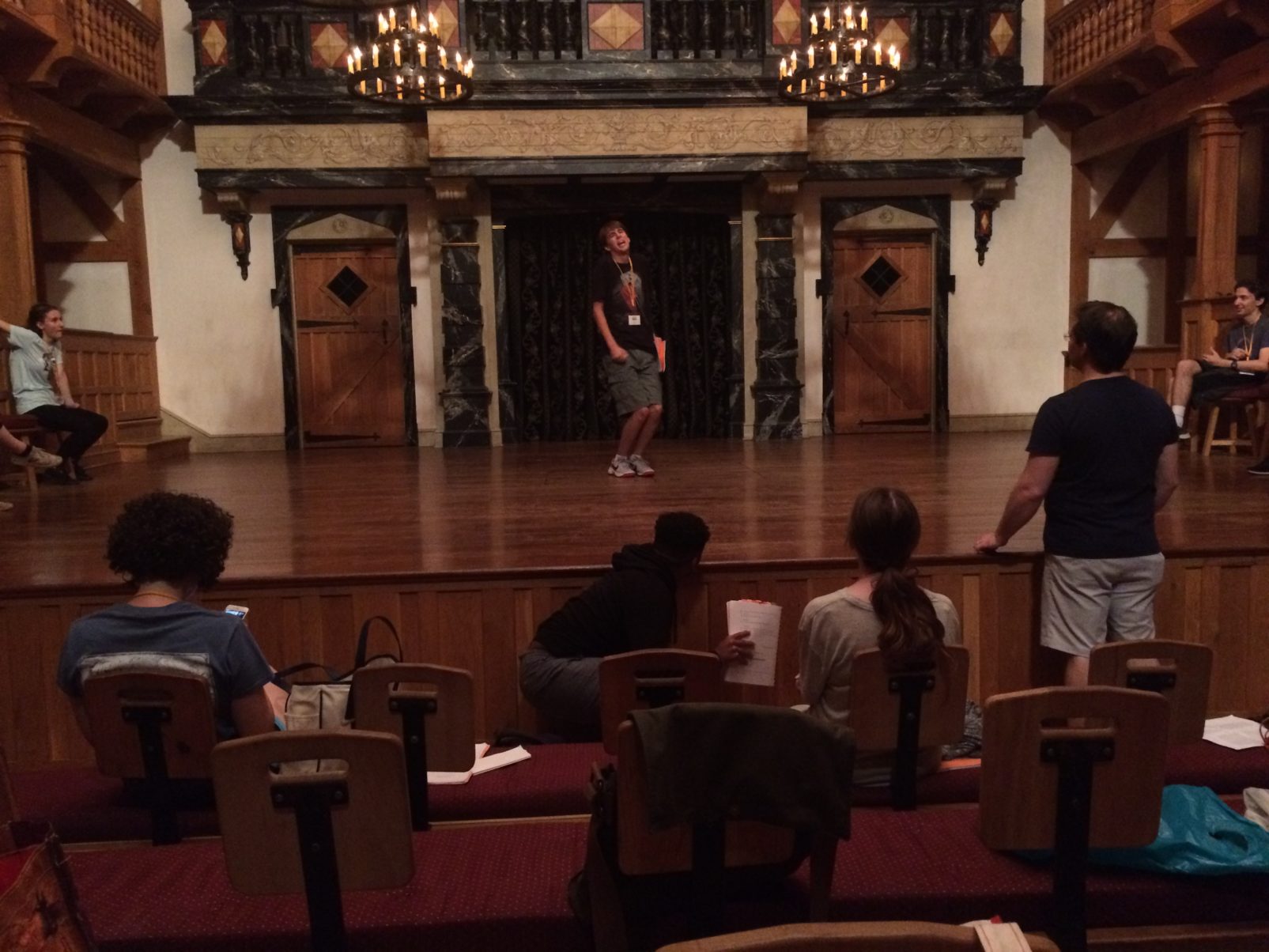Four lovers, a country clown, and jokes as stupid as the pun “Jud-ass Maccabeus”– at a glance, Love’s Labour’s Lost is no King Lear when it comes to seriousness. George Bernard Shaw once called it a “sunny, joyous, delightful play” (Collins). Most of Shakespeare’s comedy are peppered with darkness, be it Hero’s faked death in Much Ado or Rosalind’s exile in As You Like It. Love’s Labour’s is oddly joyous all the way through– until the end, where things take a surprisingly dark turn. Amongst all the merriment, a messenger comes in to reveal the news the the Princess’ father has died, and she is now queen of France. All the couples part ways, promising that in a year they will be together again. The entire play has been a fun romantic romp and suddenly, someone died? None of the couples can be together? Even the clown is upset? When do Shakespeare’s clowns ever get upset? (Touchstone excluded. Touchstone is always upset). It’s basically two completely different plays. A long comedy, and a very short tragedy. So why is it like this? As with most things in life, I don’t know. But! I can propose a theory, and my theory is this: this play is about more than just a flirtatious flight of fancy. It’s about growing up.

The idea of maturity is presented from the very first line of the show: the King of Navarre establishes that in order to be taken seriously as studious scholars, he and his lords take an austere course of study. They must fast one day week, and only eat once a day otherwise. They are forbidden from sleeping more than three hours at night, napping, talking to women, and, in general, having any kind of fun (psychologically speaking, this is actually a very ineffective way to study. As a college student, I can say that from first hand experience). Ferdinand wants his court be remembered. He is proving that he and his lords have self control, so they swear an oath that they will give up all of these things. I wonder how long that’s gonna last. (It lasts like two seconds, for those of you who have never seen the play. Otherwise this would be a pretty short play. Boyet would be like “The Princess of France is here to talk to you!” and the “King would be like “I can’t talk to women bye” and then the show would be over.) But not only do the King and the lords fall in love with the Princess and her ladies, they fall in love with them LITERALLY THE MOMENT THEY SEE THEM. Like, Longaville has never even spoken to Maria, but he’s already writing her poems about how she is a goddess. YOU HAD ONE JOB, GUYS. WHAT’S GONNA HAPPEN TO YOUR LITTLE ACADEME, HM? The ladies, on the other hand, have come here for business, and business alone. They have no interest in finding husbands. But like, a little flirting never hurt anyone right? Clearly these men are infatuated with them. Might as well have some fun.

The men, though trying so hard to be mature, and up just being artificial. Constantly speaking in rhyme and verse, the men romanticize the idea of being in love more than they do the women they are in love with. Danish critic George Brandes notes how the play mocks “artificiality in style and utterance” to the point the play almost becomes a “tedious” parody of itself (Londré). It is no wonder that they women do not take their gestures of affection seriously. Even when Rosaline flat out tells Biron to speak simpler, he can’t do it. At a glance, it looks like the women are the paragon of maturity by comparison. They are in Navarre for business, not pleasure, and they find the men’s wooing humorous. But they’re not perfect either. They get so caught up in their mocking the men they don’t seem to realize they are doing real damage. So herein lies the problem: the lords are too in love with the idea of love to be authentic, and they women are too in love with themselves to be authentic. Both parties better grow the heck up. (Fischer)
However, the lovers are not the only ones who act in a superficial, somewhat childish manner. Even the old school teacher, Holofernes, acts in an artificial way. Ever trying to showcase his linguistic talents, he is constantly sprinkling (or rather, dumping) Latin words and classical references into his speech. Holofernes is the ultimate mansplainer. Like, he literally tries to explain what the ground is. And how to pronounce the word “debt” (with the b, apparently.) But for what? To show off? The only moment we see Holofernes show any genuine emotion is when the lovers mock him during the performance of the Nine Worthies. Other than this, everything he does is all in good fun, like making fun of the constable Dull or writing a pun-filled epitaph for a deer the Princess killed. The moment he hears somewhat decent poetry that might rival his own, he just has to go and prove why the verses are “very unlearned” (4.2.491) He may be older, but he’s just as childish as the rest of them.
Examples of artifice are everywhere in this play. Especially in the scene where the women LITERALLY PUT ON MASKS to confuse the lords, WHO ARE DISGUISED AS RUSSIANS. It’s all about facades, fun, and general fooling around.
And then the King of France dies.
And things are not so fun anymore.
And woman we’ve been watching joke and dance and flirt is suddenly the Queen of France.
Whether or not she is ready to grow up, she has to. Because time moves on whether you are ready to grow up or not (I’m looking at you, Biron. Stop using all those fricking French words, they don’t make you sound as smart as you think they do). Instead of all coupling up, like in the Shakespeare comedies we are used to, the lovers instead part ways, hoping to see each other again in a year. In fact, in the way that we have been staging it, two of the ladies reject their lovers. The other two, the Princess and Rosaline, charge theirs with tasks. The King is to live in solitude for a year, and Biron is to use his wit to do some good by entertaining the dying in a hospital. If they want to marry their loves, they need to grow up with them. (Also, like, you literally met these women once? Calm down? Wait a while?) The ending of this “sunny, joyous, delightful play” is oddly painful.
Based on all this, I think there’s a reason the Blackfriars put this show in the same season as Peter and the Starcatcher. The both deal with the same topics: getting older and letting go. (I also think there’s a reason that they put this play with Much Ado About Nothing, but that’s for a future blog post!)

The fact that the ASC is currently doing Love’s Labour’s is both a curse and a blessing. I was a little worried when I found out the campers would be going to see the show at the Blackfriars. These kids idolize the Blackfriars actors. I remember in my camp days there were campers drawing ASC fan art. But this camp makes everyone come to terms with a painful truth: we cannot all be Alli Glenzer, as much as we want to. I was concerned the campers would see the wonderful work the Blackfriars actors are doing, and try to mimic is. But as our director Andrew points out, despite the fact that we are doing the same play, we are telling a different story. We have a different cut. We have different actors. Specifically, we have younger actors. Which is honestly perfect for such a coming-of-age story. The playfulness of the flirty quarreling, the quickly changing affections, the desperate desire of the Princess and King to be taken seriously as adults– these are all things that are all too familiar to teenage actors. So we’d better take advantage of that. As Biron says, denying this would be “flat treason ‘gainst the kingly state of youth” (4.3.609). If we did not utilize our campers’ young years, we would be wasting a great opportunity. This is the perfect show to do with camp. John Murrel says in his play “Taking Shakespeare” that once you’re old enough to understand Shakespeare, “you’re too old to feel it anymore.” (Fischer) These kids get to understand it and feel it at the same time!
Thus far, I think the campers have been doing a great job maintaining that youthful spirit. Like the lords just improvised a dance for the scene where they are disguised as Russians and it was honestly amazing. And I’ve never seen a group of teen actors so excited as when the director compared the ladies’ characters the the Crystal Gems in Steven Universe (the Princess of France is Pearl, in case anyone was wondering). Considering the whimsical nature of our rehearsals, I think this performance really merits the name, “play.” These kids are playing the heck out of this show. It is lovely to see them discover how the characters must strike a balance between fun and business. As it turns out, sometimes most mature thing to do is know when to be a child.
Works Cited:
Carroll, William. “The Wars of Love’s Labour’s Lost: Performance and Interpretation”. Actes des congrès de la Société française Shakespeare. http://shakespeare.revues.org/3079 ; DOI : 10.4000/shakespeare.3079
Fischer, Mike. “Love’s Labour’s Lost: A Winning Comedy”. The Journal Senteniel. USA Today, 2017.
Londré, Felicia Hardison. Love’s Labour’s Lost: Critical Essays. Routledge, 2000.

